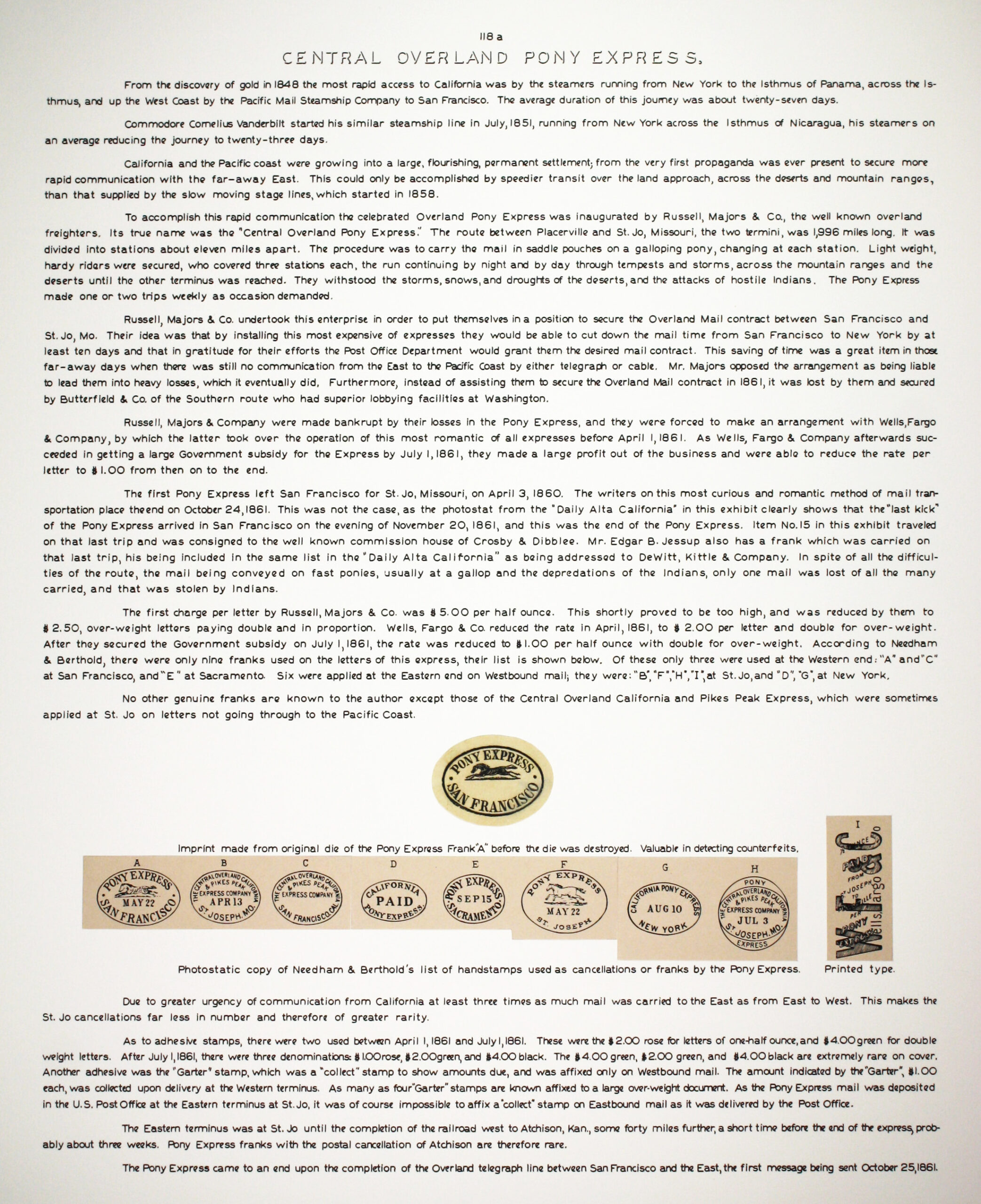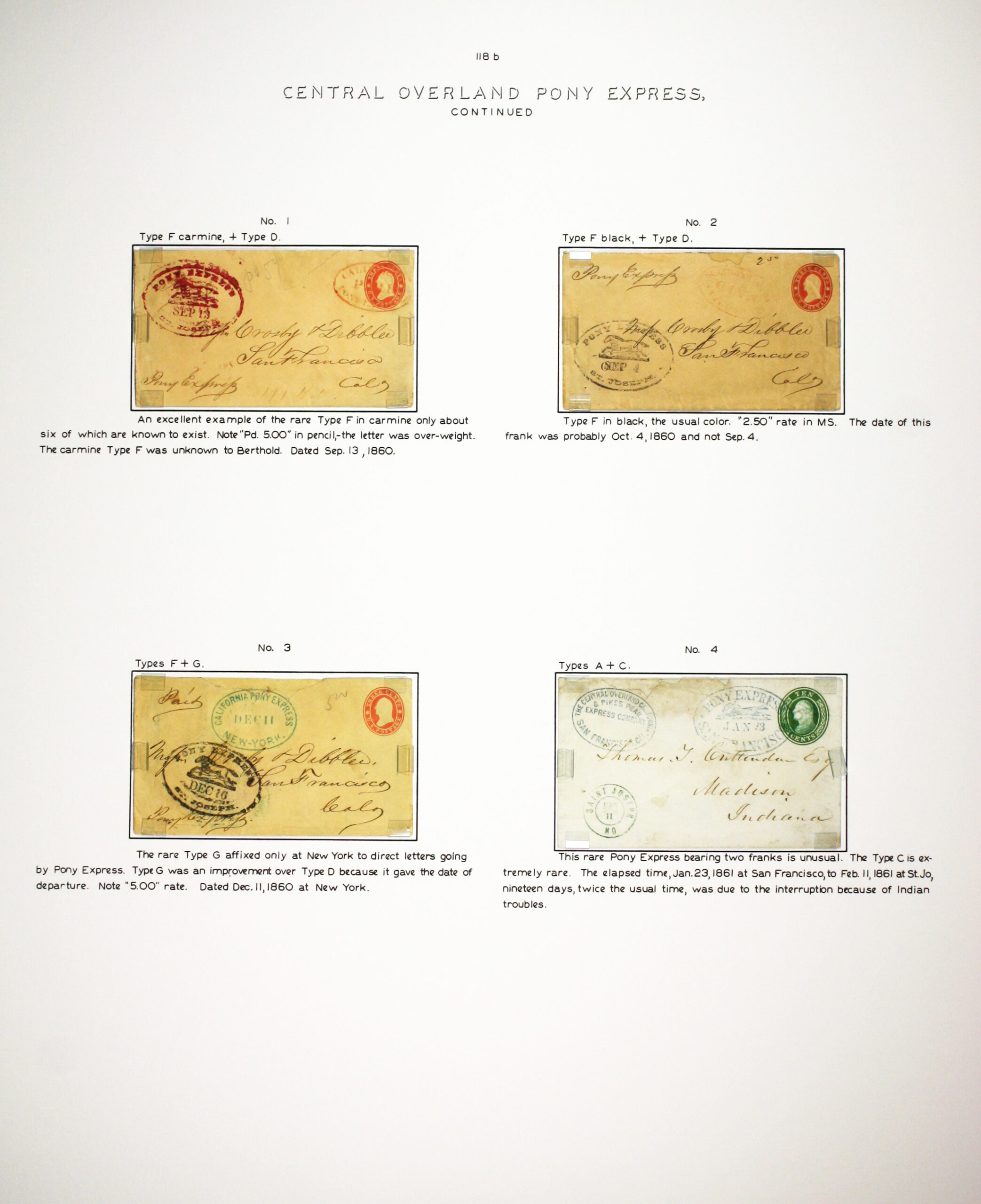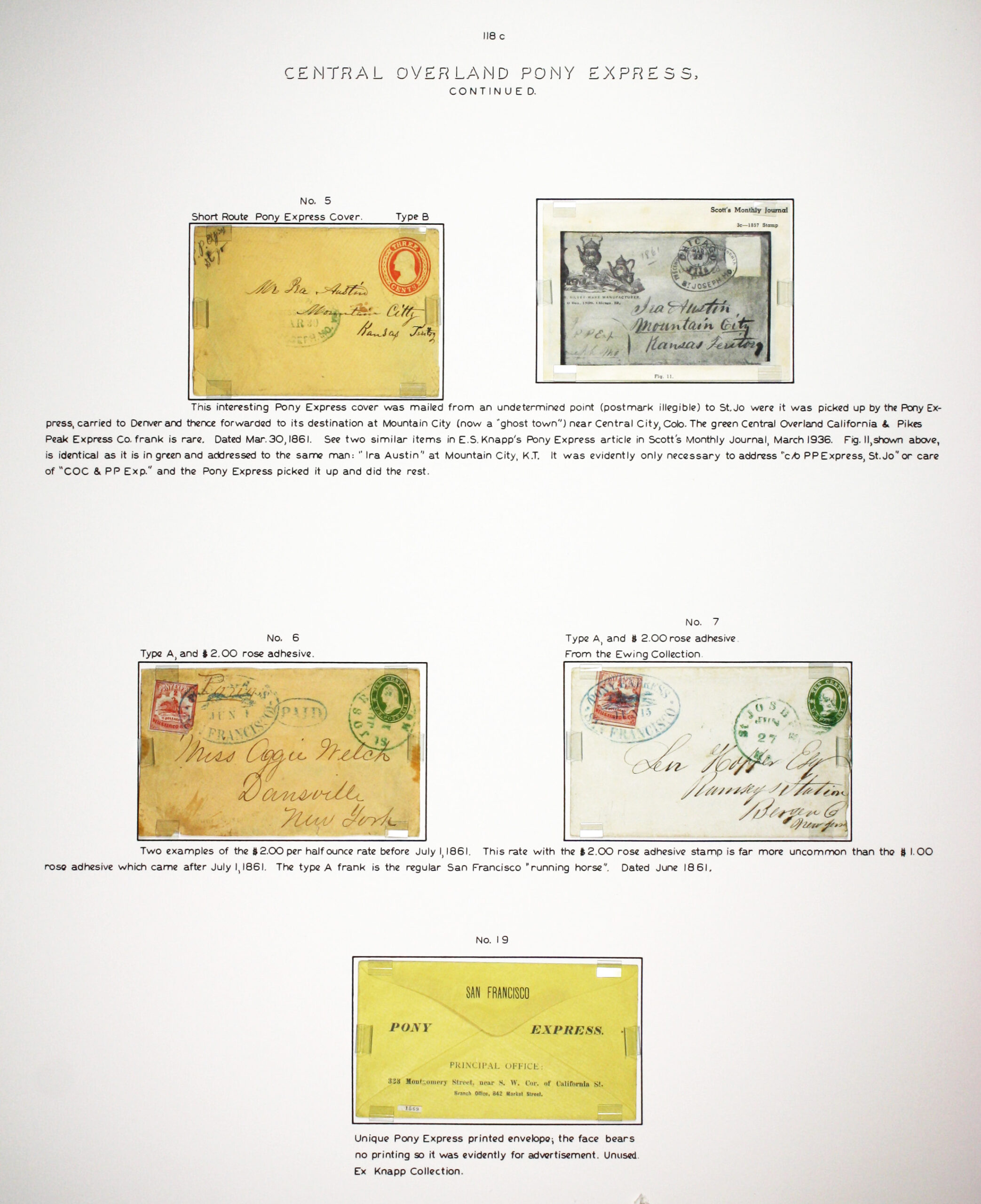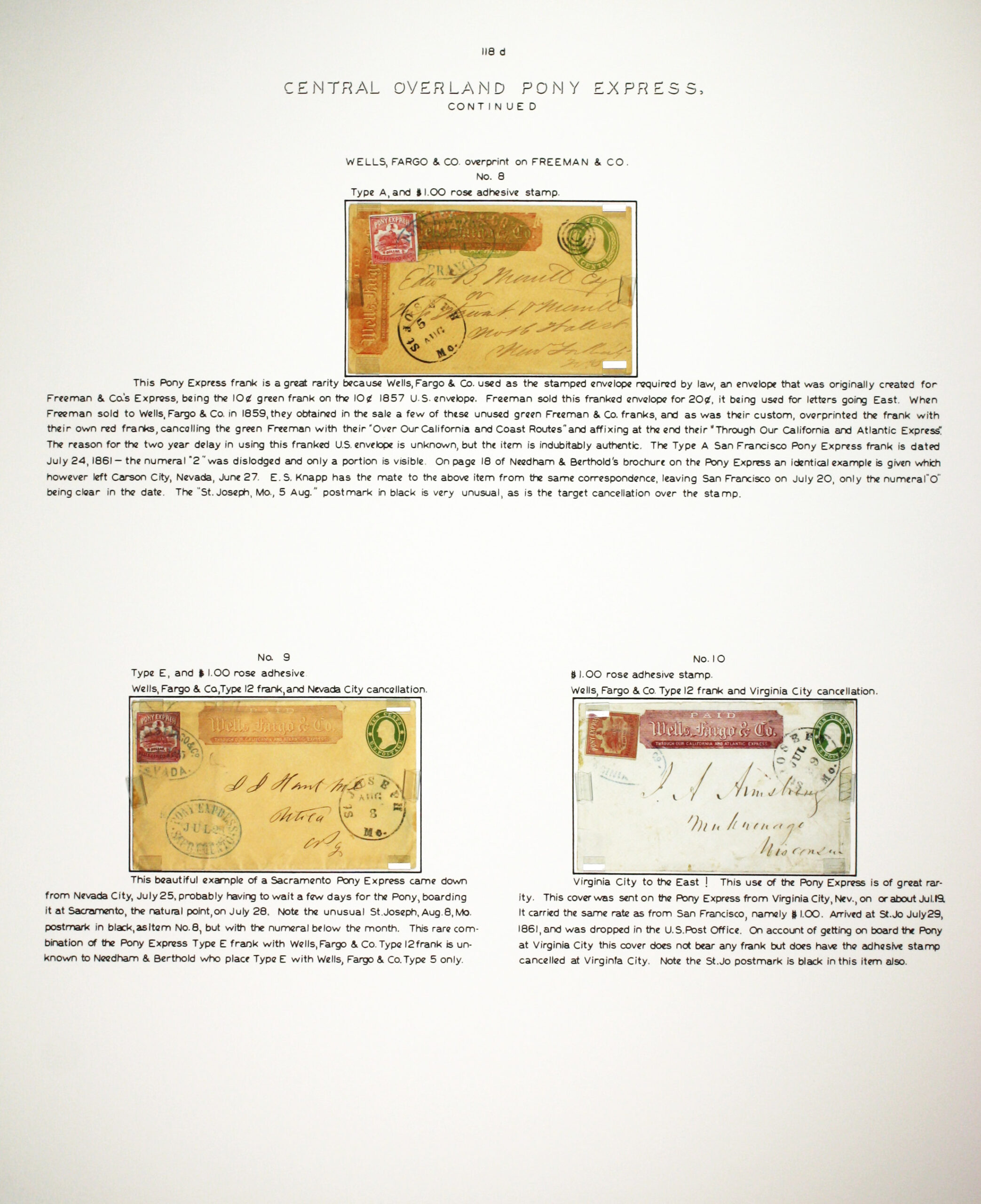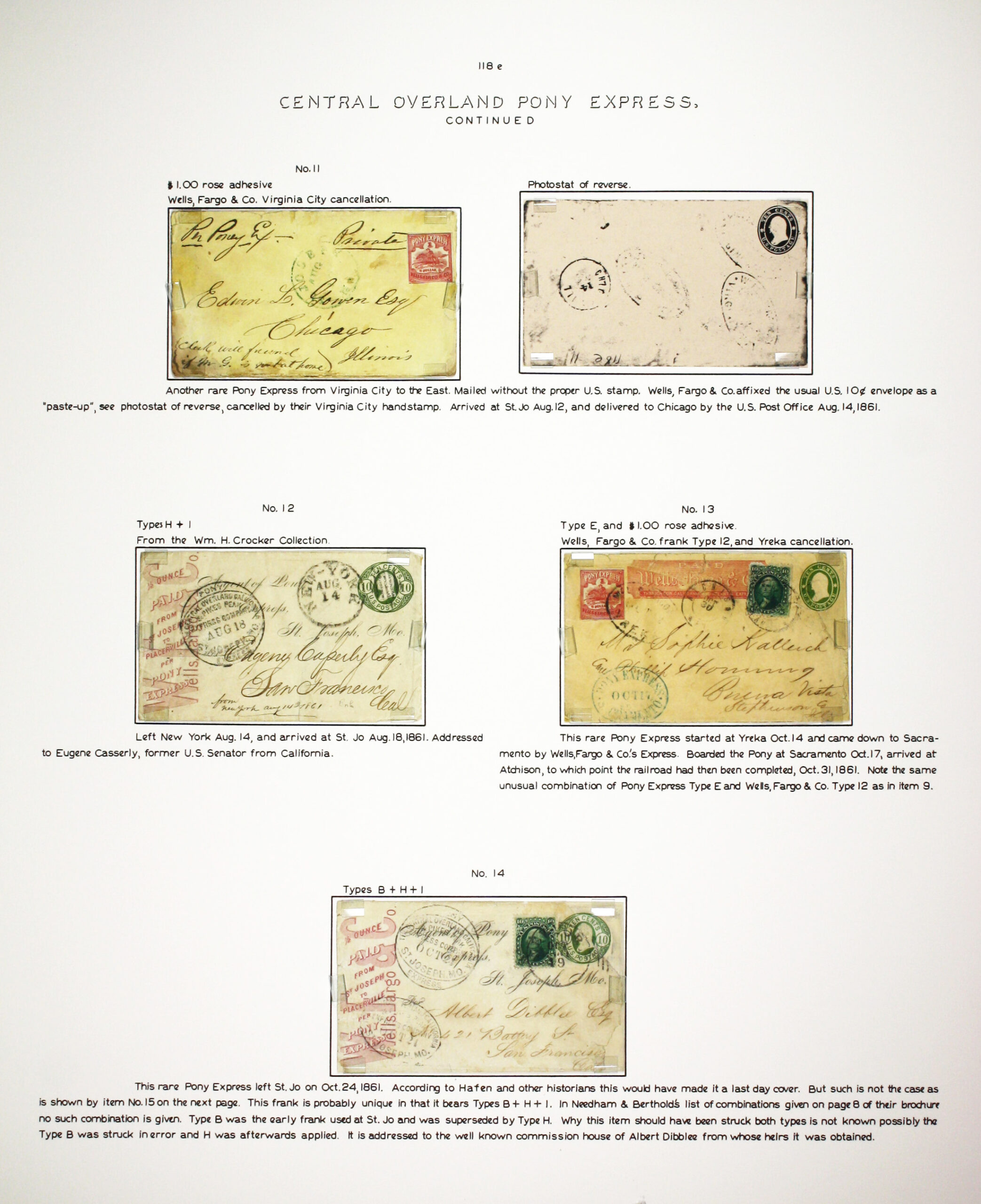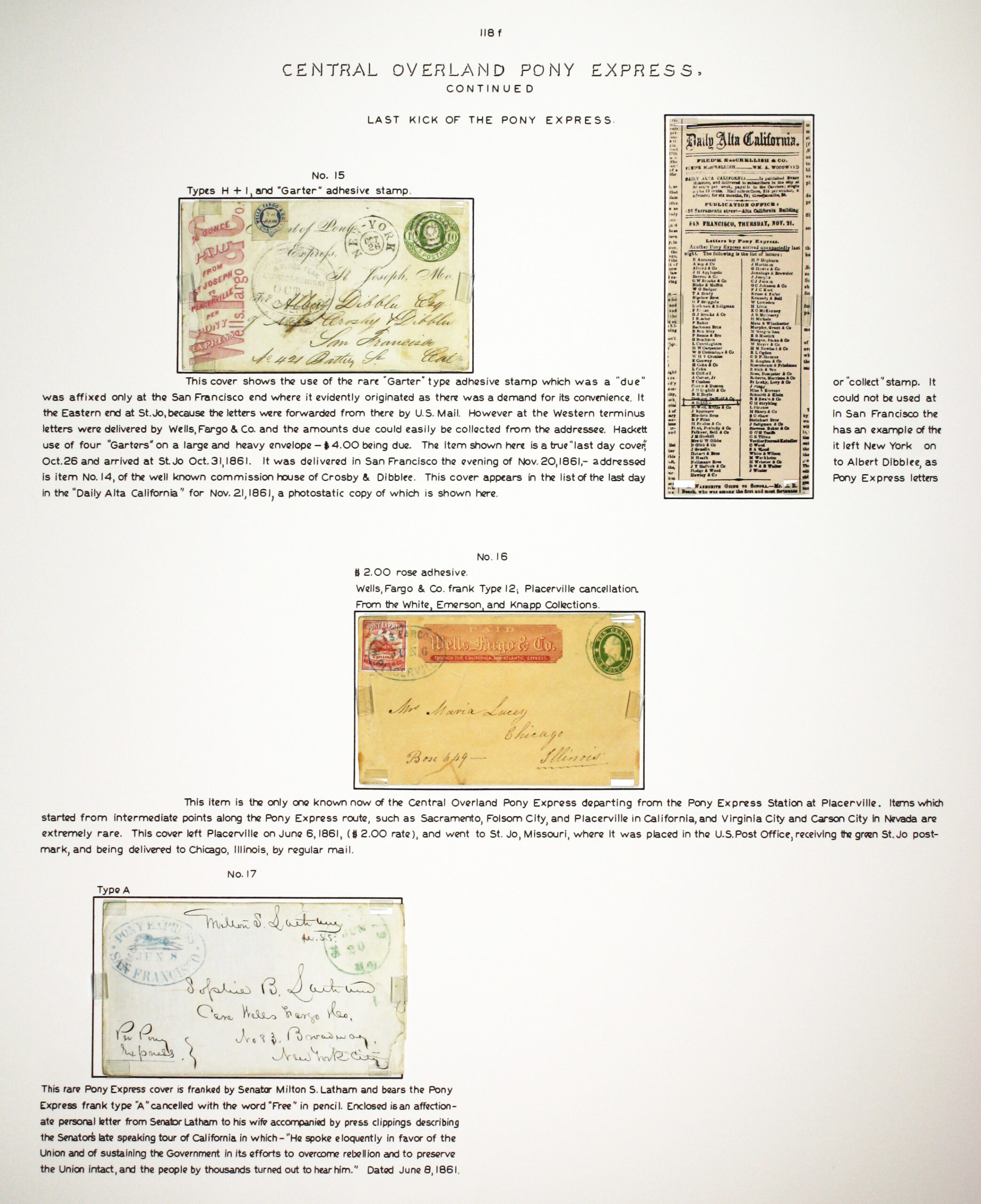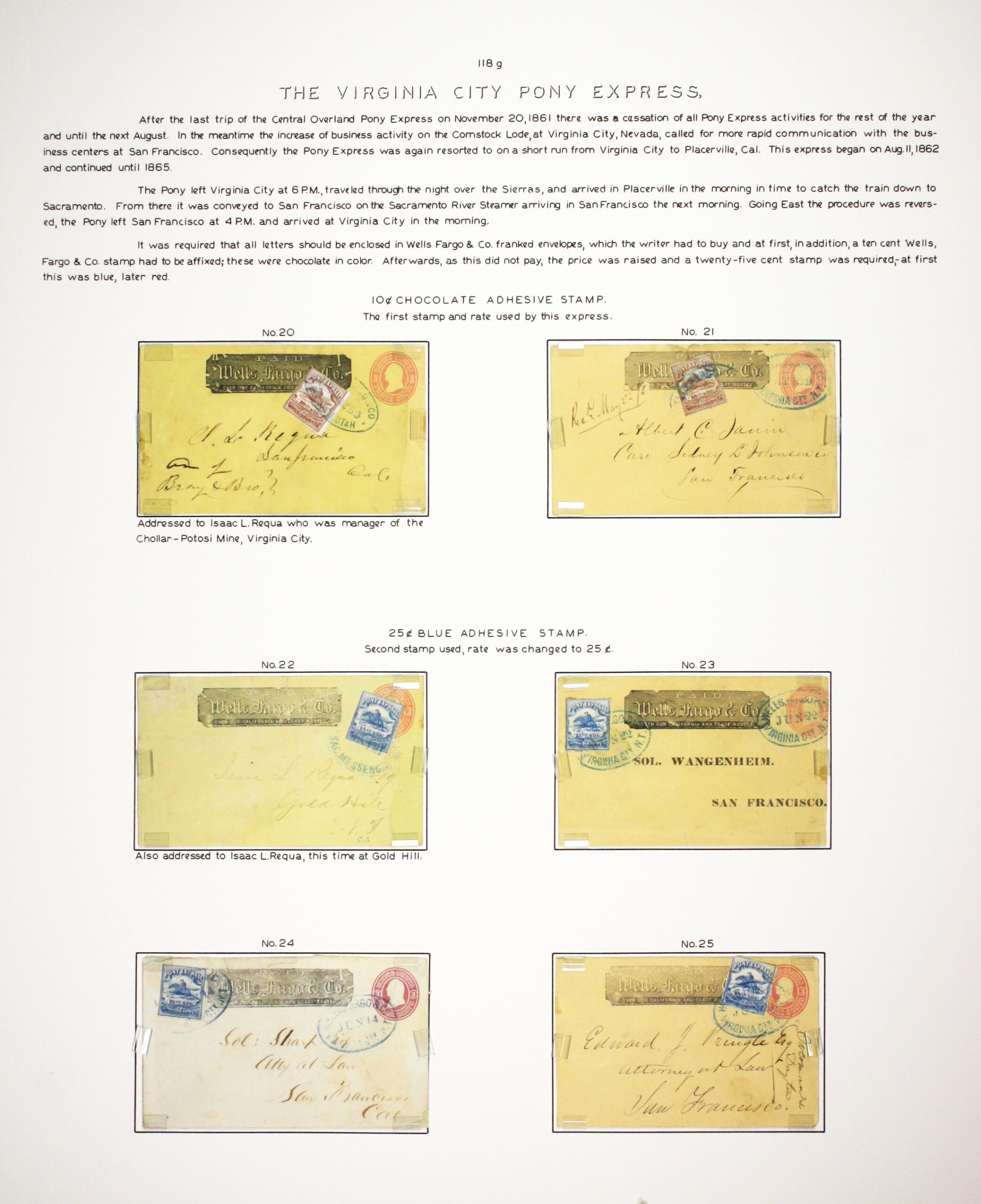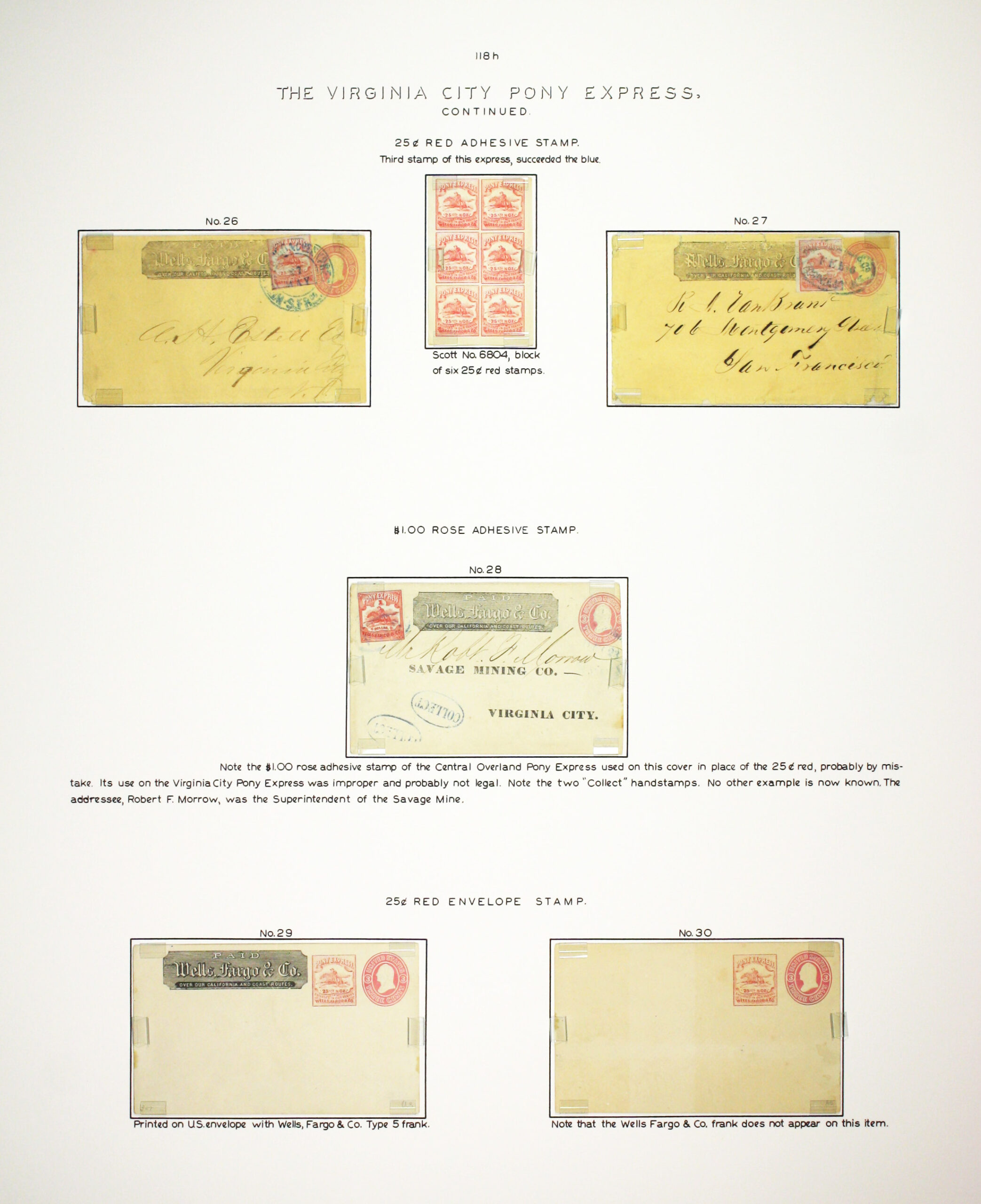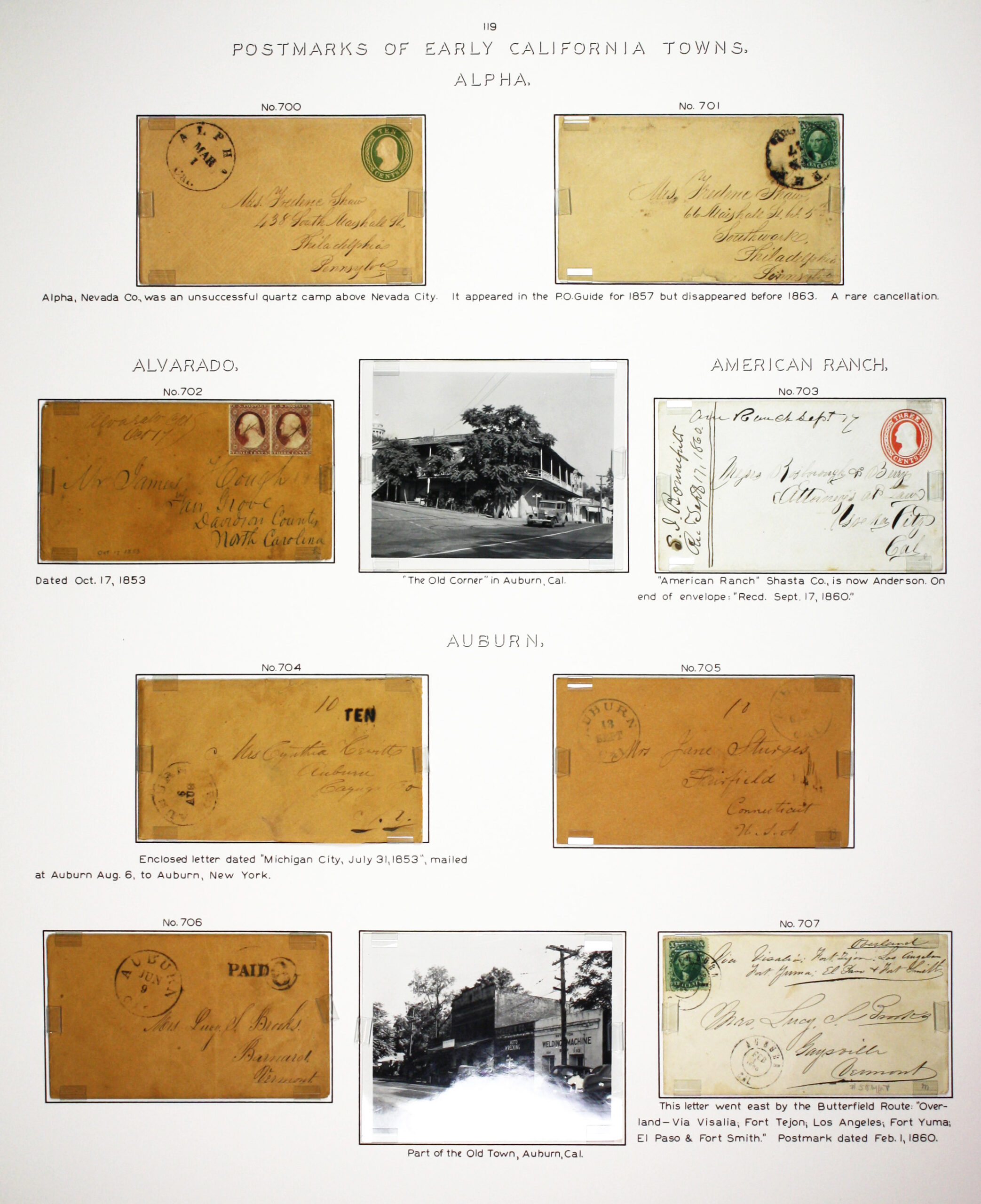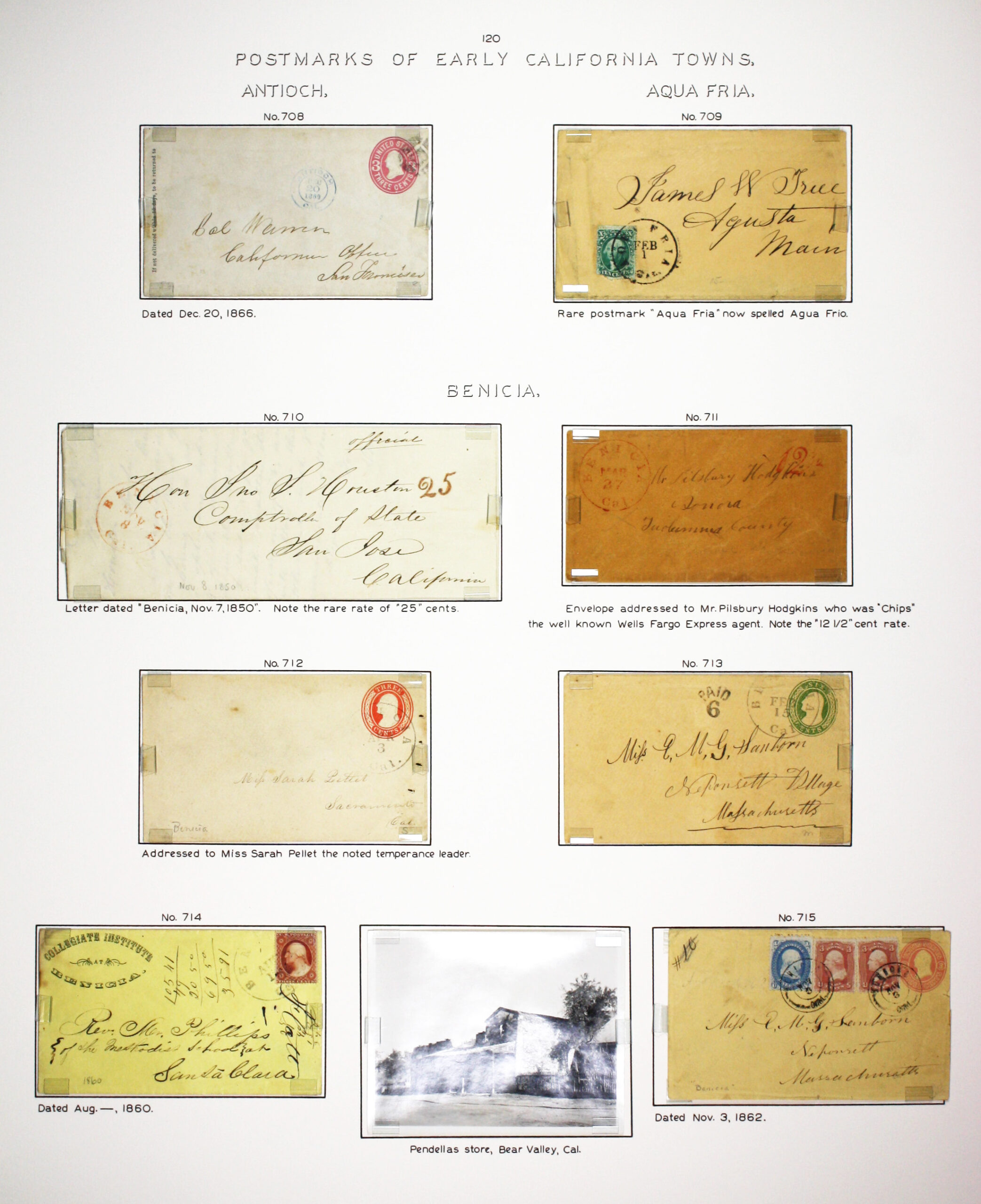Wiltsee Collection Panels 118 – 120
Panel 118B
The writers of these important letters needed them sent fast. To see them delivered in a revolutionary 10 days, they paid as much as $5 (equivalent to $100 today) to send by Pony Express.
Pony Express No. 1
Sent to Crosby and Dibblee in San Francisco, California. Taken by the Central Overland Pony Express.
Pony Express No. 2
Sent to Crosby and Dibblee in San Francisco, California. Taken by the Central Overland Pony Express.
Pony Express No. 3
Sent to Crosby and Dibblee in San Francisco, California. Taken by the Central Overland Pony Express.
Pony Express No. 4
Sent to Thomas T. Crittenden in Madison, Indiana. Taken by the Central Overland Pony Express.
Panel 118C
The writers of these important letters needed them sent fast. To see them delivered in a revolutionary 10 days, they paid as much as $5 (equivalent to $100 today) to send by Pony Express.
Pony Express No. 5
Sent to Ira Austin in Mountain City, Kansas Territory. Taken by mail to St. Joseph’s where it went by Pony Express to Denver, and was forwarded to Mountain City, now a ghost town near Central City, Colorado.
Cover from E. S. Knapp
A copy of a similar cover from E. S. Knapp’s collection published in Scott’s Monthly Journal in 1936.
Pony Express No. 6
Sent to Aggie Welch in Dansville, New York. Taken by Wells Fargo Pony Express.
Pony Express No. 7
Sent to Levi Hopper in Ramsey Station, New York. Taken by Wells Fargo Pony Express. Inside is a letter dated June 15, 1861 from J. A. Magagnos asking for “return answer by Pony Express.”
Pony Express No. 19
Unused printed envelope advertising the Pony Express from San Francisco.
Panel 118D
The writers of these important letters needed them sent fast. To see them delivered in a revolutionary 10 days, they paid as much as $5 (equivalent to $100 today) to send by Pony Express.
Pony Express No. 8
Manuell in New York City, New York. Taken by Wells Fargo Pony Express.
Pony Express No. 9
Sent to J. J. Hunt in New York. Taken by Wells Fargo from Nevada City, California, to Sacramento where it traveled by Pony Express to St. Joseph, Missouri. From there forwarded by U.S. mail to New York.
Pony Express No. 10
Sent to J. A. Armstrong in Mukwonago, Wisconsin. Taken by Wells Fargo Pony Express from Virginia City, Nevada, to St. Joseph, Missouri, where it was forwarded by U.S. mail.
Panel 118E
The writers of these important letters needed them sent fast. To see them delivered in a revolutionary 10 days, they paid as much as $5 (equivalent to $100 today) to send by Pony Express.
Pony Express No. 11
Sent to Edwin L. Gowen in Chicago, Illinois. Taken by Wells Fargo Pony Express from Virginia City, Nevada, to St. Joseph, Missouri. There it was forwarded by U.S. mail to Chicago.
Pony Express No. 12
Sent to Eugene Casserly, a former U.S. Senator from California, living in San Francisco. Taken by the Central Overland California and Pike’s Peak Express Company and Wells Fargo Pony Express.
Pony Express No. 13
Sent to Sophie Kalleich in Buena Vista, Illinois. Taken by Wells Fargo from Yreka, California, to Sacramento, California. There it went by Pony Express to Atchison, Kansas, where the latest extension of the railroad had been completed.
Pony Express No. 14
Sent to Albert Dibblee in San Francisco, California. Taken by the Central Overland California and Pike’s Peak Express Company and Wells Fargo Pony Express.
Panel 118F
The writers of these important letters needed them sent fast. To see them delivered in a revolutionary 10 days, they paid as much as $5 (equivalent to $100 today) to send by Pony Express.
Pony Express No. 15
Sent to Albert Dibblee in San Francisco, California. This cover left New York on October 26, 1861, and was delivered in San Francisco on November 20, 1861, and is considered one of the last deliveries made by Pony Express.
Pony Express No. 16
Sent to Maria Lacey in Chicago, Illinois. This cover left the Central Overland Pony Express station in Placerville, California, on June 6, 1861.
Pony Express No. 17
Sent to Sophie B. Latham in New York City, New York. Taken by Pony Express. Inside is a letter from U.S. Senator Milton S. Latham to his wife Sophie discussing his speaking tour in California during the start of the Civil War. Newspaper clippings he enclosed in the letter reported that “He spoke eloquently in favor of the Union and of sustaining the Government in its effort to overcome rebellion and to preserve the Union intact, and the people by thousands turned out to hear him.”
Newspaper article listing letters that arrived “unexpectedly” by Pony Express on November 20, 1861.
Panel 118G
Letters taken on the Virginia City Pony Express. After the Central Overland Pony Express stopped operating, mining in the Comstock Lode in Nevada created demand for rapid communication with San Francisco. Wells Fargo created a Pony Express to operate between Virginia City and Placerville, California. The horse and rider left Virginia City at 6pm, traveling through the Sierras at night, and arriving in Placerville in time to catch the train to Sacramento. Letters arrived by steamer the next morning in San Francisco.
Pony Express No. 20
Sent to Isaac L. Requa in San Francisco, California. Requa managed the Chollar-Potosi Mine in Virginia City, Nevada. Taken by the Virginia City Pony Express, run by Wells Fargo.
Pony Express No. 21
Sent to Albert C. Janin in San Francisco, California. Taken by the Virginia City Pony Express, run by Wells Fargo.
Pony Express No. 22
Sent to Isaac L. Requa in the Gold Hills of the Nevada Territory. Isaac L. Requa managed the Chollar-Potosi Mine in Virginia City, Nevada. Taken by the Virginia City Pony Express, run by Wells Fargo.
Pony Express No. 23
Sent to Sol. Wangenheim in San Francisco, California. Taken by the Virginia City Pony Express, run by Wells Fargo.
Pony Express No. 24
Sent to Sol. Sharp in San Francisco, California. Taken by the Virginia City Pony Express, run by Wells Fargo.
Pony Express No. 25
Sent to Edward J. Pringle in San Francisco, California. Taken by the Virginia City Pony Express, run by Wells Fargo.
Panel 118H
Letters taken on the Virginia City Pony Express. After the Central Overland Pony Express stopped operating, mining in the Comstock Lode in Nevada created demand for rapid communication with San Francisco. Wells Fargo created a Pony Express to operate between Virginia City and Placerville, California. The horse and rider left Virginia City at 6pm, traveling through the Sierras at night, and arriving in Placerville in time to catch the train to Sacramento. Letters arrived by steamer the next morning in San Francisco.
Pony Express No. 26
Sent to A. H. Estell in Virginia City, Nevada Territory. Taken by the Virginia City Pony Express, run by Wells Fargo.
Pony Express No. 27
Sent to R. N. Van Brunt in San Francisco, California. Taken by the Virginia City Pony Express, run by Wells Fargo.
Pony Express No. 28
Sent to Robert F. Morrow, Superintendent of the Savage Mining Company, in Virginia City, Nevada. Taken by the Virginia City Pony Express, run by Wells Fargo.
Pony Express No. 29.
Unused Wells Fargo Pony Express cover.
Pony Express No. 30
Unused Wells Fargo Pony Express cover.
A collection of Wells Fargo Pony Express stamps.
Panel 119
See letters sent from the California towns of Alpha, Alvarado, American Ranch, and Auburn.
No. 700
Sent to Mrs. Frederic Shaw in Philadelphia, Pennsylvania. Taken by U.S. mail from Alpha, California. The town of Alpha no longer exists, but these letters show that it was once a bustling town.
No. 701
Sent to Mrs. Frederic Shaw in Philadelphia, Pennsylvania. Taken by U.S. mail from Alpha, an unsuccessful quartz camp above Nevada City.
No. 702
Sent to James Hough in Fair Grove, North Carolina, and dated October 17, 1853. Taken by U.S. mail from Alvarado, California.
No. 703
Sent to Rosborough and Berry in Yreka City, California. Taken by U.S. mail from American Ranch, now called Anderson, and received September 17, 1860.
No. 704
Sent to Mrs. Cynthia Hewitt in Auburn, New York. Taken by U.S. mail from Auburn, California. Inside is a letter dated July 31, 1853, from George Hewitt in Michigan City, California.
No. 705
Sent to Mrs. Jane Sturges in Fairfield, Connecticut. Taken by U.S. mail from Auburn, California.
No. 706
Sent to Mrs. Lucy Brooks in Barnard, Vermont. Taken by U.S. mail from Auburn, California.
No. 707
Sent to Mrs. Lucy Brooks in Gaysville, Vermont. Taken from Auburn, California by U.S. mail east via stage along the Butterfield Route: “Overland—Via Visalia; Fort Tejon; Los Angeles; Fort Yuma; El Paso & Fort Smith.” Postmark dated Feb. 1, 1860.
Photograph of “the Old Corner” in Auburn, California, 1930s.
Photograph of Old Town in Auburn, California, 1930s.
Panel 120
Letters from Antioch, Aqua Fria, and Benicia.
No. 708
Sent to Col. Warren in San Francisco, California. Taken by U.S. mail from Antioch, and dated December 20, 1866.
No. 709
Sent to James W. True in Augusta, Maine. Taken by U.S. mail from Aqua Fria, now spelled Agua Fria, California.
No. 710
Sent to Comptroller of the State of California John S. Houston in San Jose, California. Taken by U.S. mail from Benicia, California. Inside is a letter dated November 7, 1850 from David F. Bererige.
No. 711
Sent to Pilsbury “Chips” Hodgkins, the well-known Wells Fargo messenger, in Sonora, California. Taken by U.S. mail from Benicia.
No. 712
Sent to Miss Sarah Pettet, a noted temperance leader, in Sacramento, California. Taken by U.S. mail from Benicia.
No. 713
Sent to E. M. G. Sanborn in Neponsett Village, Massachusetts. Taken by U.S. mail from Benicia.
No. 714
Sent to Rev. Phillips in Santa Clara, California, from the Collegiate Institute at Benicia. Taken by U.S. mail in August 1860.
No. 715
Sent to E. M. G. Sanborn in Neponsett, Massachusetts. Taken by U.S. mail from Benicia.
Photograph of Pendellas store in Bear Valley, California, 1930s.
